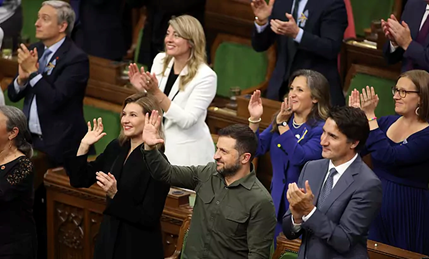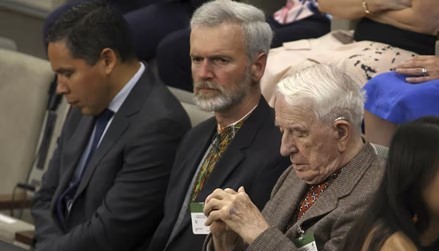
Russian presidential spokesman Dmitry Peskov expressed deep dismay at what he described as a “careless attitude toward memory” of Nazi crimes in Canada. The controversy arose when a Nazi veteran received a standing ovation in Canada’s local Parliament last week.
Nazi Crimes Without an Expiration Date
Peskov stressed that Nazi crimes should have no expiration date or statute of limitations, calling this kind of forgetfulness of memory “outrageous.” According to him, a generation has emerged in the West that has forgotten the crucial lessons of World War II, which poses the risk that fascism could re-emerge in the world. Peskov stressed: “They know nothing of the threat of fascism. This can lead to the emergence of fascism anywhere, as we are seeing in central Europe, in Ukraine. This is precisely what we are fighting for.”
Origin of the Controversy
The controversy was sparked when a photograph was published showing Ukrainian President Vladimir Zelensky alongside Canadian Prime Minister Justin Trudeau applauding World War II veteran Yaroslav Hunka, 98. Hunka had wrestled in the Ukrainian First Division before emigrating to Canada. However, this division, also known as the 14th Waffen-SS Grenadier Division or Galizien Division, had been composed mostly of Ukrainian volunteers from the Galicia region, and is known to have committed war crimes against Polish civilians during World War II, as well as recruiting Slavic soldiers for the ranks of the Third Reich.
Hunka was invited by House of Commons Speaker Anthony Rota, who introduced him as a “Ukrainian and Canadian hero” who had fought for Ukraine’s independence against the Russians. However, Rota subsequently expressed regret for not having further investigated Hunka’s past and called the event a “terrible error of judgment.”

Critical Reactions
Hugka’s presence in the Canadian legislature unleashed an avalanche of criticism both nationally and internationally. Canadian opposition leader Pierre Poilievre urged the prime minister to offer a personal apology for failing to investigate Hunka’s record, leading to a “serious error of judgment.” In addition, the Russian ambassador to Canada, Oleg Stepanov, announced that Russia would demand explanations from Canada for the incident.
Several human rights and social welfare organizations also denounced the incident. Michael Mostyn, CEO of B’nai Brith, one of the oldest Jewish organizations, said: “Parliament owes an apology to all Canadians for this outrage. Also, a detailed explanation of how this could have taken place at the heart of Canadian democracy.” Similarly, the Jewish community Friends of the Simon Wiesenthal Center for Holocaust Studies issued a statement stating:
“The fact that a veteran who served in a Nazi military unit was invited and cheered in Parliament is outrageous.”

For more articles like this, click here.
